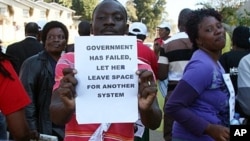Swaziland activists are calling on international companies working in the small African nation to withdraw their support for the country’s King Mswati.
Many Swazis have criticized the king's expensive lifestyle, which includes 13 wives, at a time when the tiny country is going through tough economic times.
Lucky Lukhele, spokesperson for the Swaziland Solidarity Network, said companies such as Coca-Cola, which has its biggest African operation in Swaziland, should stop claiming neutrality and speak out against the King's anti-democratic ways, such as the ban on political parties.
“They must then come out openly, there is no neutrality in any situation. So therefore, it’s clear to us, if they claim to be neutral, there is no way that you can be neutral when there is an oppressor next to you,” said Lukehle.
He compares the Swaziland situation, where Mswati rules over Sub-Saharan Africa’s last absoluate monarchy, to apartheid in South Africa, when Coca-Cola pulled its operations out of that country.
“We are not saying that they must pull out of Swaziland, but they must start supporting democratic efforts of all the democratic organizations currently calling for democratization in Swaziland,” Lukehele said.
Companies have shown their support of the King by praising him in advertisements and donating to some of the king’s lavish events, according to Lukehele.
He also called on the International Criminal Court to investigate the King.
The Swaziland Solidarity Network encourages a cultural boycott of Swaziland and works with other organizations to isolate King Mswati. The network describes the king as an absolute ruler who tolerates no democratic organizations, trade unions or free media.
King Mswati has ruled the southern African nation of 1.2 million people since 1986 as sub-Saharan Africa's last absolute monarch.








